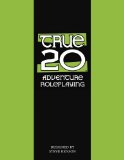The Revised Edition of True 20 by Green Ronin is a simple, yet very extensive gaming manual. The contents cover every setting imaginable and allows for a great deal of customization.
This guide includes information for GM’s, players, and fairly extensive bestiary allowing people on tight budgets play without investing a lot of money. For those with larger disposable incomes, Green Ronin also publishes additional material that can be used with the game, but none of it is required.
There are three base classes: expert, warrior, and adept. These classes can be played as-is, one of the variants of these classes tailored for a specific game type can be used, or a new class can be designed using the easy to follow customization rules. These base classes have pre-created varieties for the gaming environments illustrated in the rule book. For instance, Champion in fantasy settings, Specialist for space adventures, Arcanist for horror games, and Occultist for modern themes.
Since all of these settings use the same rules, it is trivial to mix them. For example, a space horror setting such as found in Aliens, Pandorum, or Dead Space. Or even, my least favorite – but apparently often used – theme of mecha vs. dragons.
The rules are extremely simple; as the name would imply, the only die needed is a d20. Characters are created using a point buy system and abilities can be between -5 and +5. The player starts with 6 points and all 6 stats start at 0. From here, the player can add and subtract points until the character is fully created. Instead of looking on a chart, or remembering what the modifier is for a given ability, the ability score itself is added to rolls. This cuts down on the amount of in-game calculations and chart lookups, thus making the game run smoother and with less delays.
Much of the game reminds me of the spirit of Palladium’s offerings: interoperability between genres, highly customizable, quick to setup, and all core rules in one book. I plan on giving more in depth reviews of each of these genres covered in the core rules in future articles. If you have a suggestion on which genre to cover first, please feel free to post that in the comments.

I’ve always really liked True 20. I really wish Paizo had decided to support True 20 when leaving 3.5 instead of creating Pathfinder. Looking forward to your observations.
Thanks for the comment. I will probably look more in depth at either the fantasy setting or horror setting first unless I get a large response for space or modern.
[…] you have not yet read my overview on True 20 as a whole, you may want to start there for a general description of the overall […]